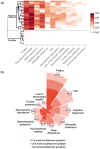A Comprehensive Examination of Severely Ill ME/CFS Patients
- PMID: 34682970
- PMCID: PMC8535418
- DOI: 10.3390/healthcare9101290
A Comprehensive Examination of Severely Ill ME/CFS Patients
Abstract
One in four myalgic encephalomyelitis/chronic fatigue syndrome (ME/CFS) patients are estimated to be severely affected by the disease, and these house-bound or bedbound patients are currently understudied. Here, we report a comprehensive examination of the symptoms and clinical laboratory tests of a cohort of severely ill patients and healthy controls. The greatly reduced quality of life of the patients was negatively correlated with clinical depression. The most troublesome symptoms included fatigue (85%), pain (65%), cognitive impairment (50%), orthostatic intolerance (45%), sleep disturbance (35%), post-exertional malaise (30%), and neurosensory disturbance (30%). Sleep profiles and cognitive tests revealed distinctive impairments. Lower morning cortisol level and alterations in its diurnal rhythm were observed in the patients, and antibody and antigen measurements showed no evidence for acute infections by common viral or bacterial pathogens. These results highlight the urgent need of developing molecular diagnostic tests for ME/CFS. In addition, there was a striking similarity in symptoms between long COVID and ME/CFS, suggesting that studies on the mechanism and treatment of ME/CFS may help prevent and treat long COVID and vice versa.
Keywords: antibody and antigen; clinical symptoms; cognitive tests; laboratory tests; long COVID; post-acute sequelae SARS-CoV-2 infection (PASC); quality of life; severe ME/CFS; sleep; viral infection.
Conflict of interest statement
The authors declare no conflict of interest. The funders had no role in the design of the study; in the collection, analyses, or interpretation of data; in the writing of the manuscript, or in the decision to publish the results.
Figures





References
-
- Committee on the Diagnostic Criteria for Myalgic Encephalomyelitis/Chronic Fatigue Syndrome. Board on the Health of Select Populations. Institute of Medicine . Beyond Myalgic Encephalomyelitis/Chronic Fatigue Syndrome: Redefining an Illness. The National Academies Collection: Reports Funded by National Institutes of Health; National Academies Press (US); Washington, DC, USA: 2015.
-
- Valdez A.R., Hancock E.E., Adebayo S., Kiernicki D.J., Proskauer D., Attewell J.R., Bateman L., DeMaria A., Lapp C.W., Rowe P.C., et al. Estimating Prevalence, Demographics, and Costs of ME/CFS Using Large Scale Medical Claims Data and Machine Learning. Front. Pediatr. 2018;6:412. doi: 10.3389/fped.2018.00412. - DOI - PMC - PubMed
-
- Bateman L., Bested A.C., Bonilla H.F., Chheda B.V., Chu L., Curtin J.M., Dempsey T.T., Dimmock M.E., Dowell T.G., Felsenstein D., et al. Mayo Clinic Proceedings. Elsevier; Amsterdam, The Netherlands: 2021. Myalgic Encephalomyelitis/Chronic Fatigue Syndrome: Essentials of Diagnosis and Management. - DOI - PubMed
-
- Rasa S., Nora-Krukle Z., Henning N., Eliassen E., Shikova E., Harrer T., Scheibenbogen C., Murovska M., Prusty B.K., European Network on ME/CFS (EUROMENE) Chronic Viral Infections in Myalgic Encephalomyelitis/Chronic Fatigue Syndrome (ME/CFS) J. Transl. Med. 2018;16:268. doi: 10.1186/s12967-018-1644-y. - DOI - PMC - PubMed
LinkOut - more resources
Full Text Sources
Miscellaneous

